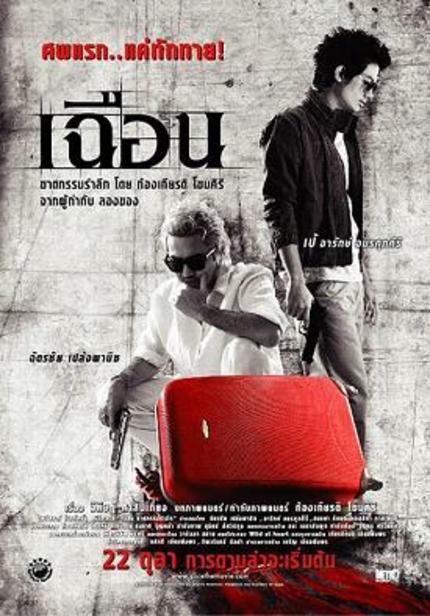Grimm Up North 2010: SLICE review

What's the best measure of how good Slice is? Perhaps this; it's technically a vicious, blood-soaked police procedural about a dirty cop who finds himself tracking down a murderer, convinced a long-lost childhood friend is the killer he's after. But it's not the violence that has the most staying power, or the setpieces, or the plot beats - it's the overwhelming sense of loss after the credits roll, which delivers an emotional punch out of all proportion to a gritty, overblown thriller.
Though Kongkiat Khomsiri is credited as writer and director, the man behind the original story is Wisit Sasanatieng, he of Tears of the Black Tiger, Citizen Dog and The Unseeable. Regardless of who did what, Sasanatieng's fingerprints are all over Slice, from the sizzling colours in much of the production design, to the picture-postcard framing that recalls Tears, to the sepia-tinged flashbacks dotted through the running time.
While the film kicks off in predictably garish style, with the killer (decked out in flowing red raincoat) mutilating a Western businessman with a predilection for young boys, once the hero's been sprung from jail it slowly begins to turn into something markedly different. Tai (Arak Amornsupasiri) is behind bars for accidentally gunning down a fellow police officer undercover. His handler, Papa Chin (Chatchai Plengpanich) wants him locked up rather than have his identity blown, so Tai handles jailhouse intrigues for Chin while waiting for the day he finally gets released.
Tai is clearly a broken man after his experiences, looking for an out in every sense. Chin has no idea how to track down whoever's beneath the raincoat, and his superiors are threatening to dissolve his department if he doesn't produce results. So when Tai insists the killer has to be his boyhood friend Nut, the other man jumps at the chance and sets him on the case.
At this point Slice breaks off into two plotlines. There's the present-day scenes, with the killer chalking up victim after victim, Tai drawing closer to the how and the why while starting to think Chin might have some dangerous ulterior motives. Then there's the flashbacks, with Tai remembering his childhood with Nut and how it was more bittersweet and important, yet at the same time rather darker, than he's allowed himself to admit.
Bear in mind this is still very much well-trodden genre territory. Tai's memories of his friend Nut are instantly recognisable as the kind of wistful melancholy a great many Thai films trade in, and it's not as if no Thai director's ever tried such a crossover before; Dorm and Alone both had elements of classic coming-of-age stories thrown in with more typical horror, to use two recent examples.
What sets Slice apart is quite how significant the flashback sequences are. While the redemptive aspects of the narrative are fairly obvious it's still genuinely painful to watch the way in which Sasanatieng and Khomsiri patiently explain, scene by scene, that Tai did successively ever more terrible things to someone who only ever wanted to be his friend. This is more than kids-will-be-kids, cleverer and nastier than South Park. Sure, the people concerned are only children and the melodrama ramped up for effect, but the emotional implications are deeply disturbing.
Whether working on his own or drawing from Sasanatieng's playbook, Khomsiri proves an effective director. Slice plays out in a very freewheeling, rough-and-ready style, but at the same time proves both technically and artistically accomplished. While the neon and grime suggests a fairly clichéd image of urban Thailand it conjures a suitably dreamlike, nightmarish mood in all the right places. One key action sequence with the killer wreaking havoc inside a nightclub full of coupling patrons in bondage wear is especially startling, managing to be seedy, kitsch, shocking and haunting all at once.
The flashbacks are similarly artfully shot - nothing especially original, but beautifully composed. Khomsiri's child cast are much more engaging than the adults, too, both Sikarin Polyong (Tai) and Arthhapan Poolsawad (Nut) giving fairly impressive performances largely free from precociousness or over-exaggeration.
The only thing that really drags Slice down is the sense that on occasion, the plot ends up lodged somewhere uncomfortably between high or low art. Not that there's anything wrong with either, and no-one in their right mind would insinuate it's not 'proper' cinema, but while the plot threads do relate (and come together very satisfyingly) the lurid gloss of the present-day segments and the gentle, high-tone nostalgia of the flashbacks occasionally feel as if they're two films smashed roughly into one. It's a fascinating, compelling crossbreed, but a decidedly ungainly one.
Nonetheless,
Khomsiri's movie deserves far more than to be left forgotten at the
end of some Xtreme Asia release schedule. It's a shotgun wedding, but
one that turns into something quite special - trashy and awkward,
but still brutal, punchy stuff that delivers a succession of visual
thrills and an utterly heartbreaking drama all in one. Consider Slice
highly recommended.
(Slice was screened as part of Manchester's Grimm Up North 2010.)







